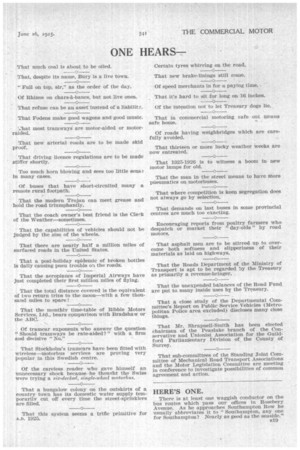ONE HEARS
Page 3

If you've noticed an error in this article please click here to report it so we can fix it.
That much coal is about to be oiled.
That, despite its name, Bury is a live town.
" Full on top, sir," as the order of the day.
Of Rhinos on chars-h-bancs, but not live ones.
That refuse can be an asset instead of a liability.
That Fodens make good wagons and good music.
',Mat most tramways are motor-aided or motorraided.
That new arterial roads are to be made skid .proof.
That driving licence regulations are to be made stiffer shortly.
Too much horn blowing and sees too little sens3 In many cases.
Of buses that have short-circuited many remote rural footpath.
That the modern Trojan can meet grease and hold the road triumphantly.
That the coach owner's best friend is the Clerk of the Weather—sometimes.
That the capabilities of vehicles should not be judged by the size of the wheels.
That there are nearly half a million miles of surfaced roads in the United States.
That a post-holiday epidemic of broken bottles is daily causing pneu trouble on the roads.
That the aeroplanes of Imperial Airways have just completed their first million miles of flying.
That the total distance covered is the equivalent of two return trios to the moon—with a few thousand miles to spare!
That the monthly time-table of Ribble Motors Services, Ltd., bears comparison with Bradshaw or the ABC.
Of tramcar exponents who answer the question "Should tramways be rate-aided?" with a firm and decisive "No."
That Stockholm's tramcars have been fitted with wireless—motorbus services are proving very popular in this Swedish centre.
Of the careless reader who gave himself an unnecessary shock because he thought the Swiss were trying a six-decked, single-wheel motorbus.
That a bungalow colony on the outskirts of a country town has its domestic water supply temporarily cut off every time the street-sprinklers are filled.
That this system seems a trifle primitive for A.D. 1925. Certain tyres whirring on the road. That new brake-linings still come.
Of speed merchants in for a paying time.
, That it's hard to sit for long on 16 inches.
Of the intention not to let Treasury dogs lie.
That in commercial motoring safe out means safe home.
Of roads having weighbridges which are carefully avoided.
That thirteen or more lucky weather weeks are now entreated.
That 1925-1926 is to witness a boom in new motor lamps for old.
That the man in the street means to have more pneumatics on motorbuses.
That where competition is keen segregation does not always go by selection.
That demands on last buses in some provincial centres are much too exacting.
Encouraging reports from poultry farmers who despatch or market their " day-olds " by road motors.
That asphalt men are to be stirred up to overcome both softness and slipperiness of their materials as laid on highways.
That the Roads Department of the Ministry of Transport is apt to be regarded by the Treasury as primarily a revenue-bringer.
That the unexpended balances of the Road Fund are put to many inside uses by the Treasury.
That a close study of the Departmental Committee's Report on Public Service Vehicles (Metropolitan Police area excluded) discloses many close things.
That Mr. Shrapnell-Smith has been elected chairman of the Peaslake branch of the Conservative and Unionist Association for the Guildford Parliamentary Division of the County of Surrey.
That sub-committees of the Standing Joint Committee of Mechanical Road Transport Associations and the Motor Legislation Committee are meeting in conference to investigate possibilities of common agreement and action.






























